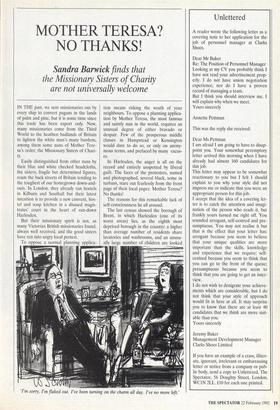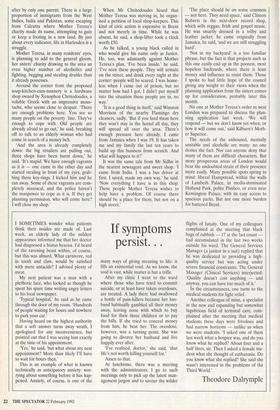MOTHER TERESA?
NO THANKS!
Sandra Barwick finds that
the Missionary Sisters of Charity are not universally welcome
IN THE past, we sent missionaries out by every ship to convert pagans in the lands of palm and pine, but it is some time since this trade has been export only. Now, many missionaries come from the Third World to the heathen badlands of Britain to lighten the white man's many burdens, among them some nuns of Mother Tere- sa's order, the Missionary Sisters of Chari- ty.
Easily distinguished from other nuns by their blue and white checked headcloths, the sisters, fragile but determined figures, roam the back streets of Britain tending to the toughest of our homegrown down-and- outs. In London, they already run hostels in Kilburn and Southall but their latest intention is to provide a new convent, hos- tel and soup kitchen in a disused magis- trates' court in the heart of run-down Harlesden.
But their missionary spirit is not, as many Victorian British missionaries found, always well received, and the good sisters have run into angry local protest.
To oppose a normal planning applica- tion means risking the wrath of your neighbours. To oppose a planning applica- tion by Mother Teresa, the most famous and saintly nun in the world, requires an unusual degree of either bravado or despair. Few of the prosperous middle classes in Hampstead or Kensington would dare to do so, or only on anony- mous terms, and prefaced by many excus- es.
In Harlesden, the anger is all on the record and entirely unspotted by liberal guilt. The faces of the protesters, named and photographed, several black, some in turbans, stare out fearlessly from the front page of their local paper. Mother Teresa? No thanks!
The reasons for this remarkable lack of self-consciousness lie all around.
The last census showed the borough of Brent, in which Harlesden (one of its worst areas) lies, as the eighth most deprived borough in the country: a higher than average number of residents share lavatories and washrooms, and an unusu- ally large number of children are looked
`I'm sorry, I'm flaked out. I've been turning on the charm all day. I've no more left.'
after by only one parent. There is a large proportion of immigrants from the West Indies, India and Pakistan, some escaping from Calcutta where Mother Teresa's charity made its name, attempting to gain or keep a footing in a new land. By just about every indicator, life in Harlesden is a struggle.
Mother Teresa, in many residents' eyes, is planning to add to the general gloom, her sisters' charity drawing to the area an even higher number of alcoholics and fighting, begging and stealing drunks than it already possesses.
Around the corner from the proposed soup-kitchen-cum-nunnery is a hardware shop owned by Xenophon Chritodoudes, a voluble Greek with an impressive mous- tache, who seems close to despair. 'There are enough problems here. You see so many people on the poverty line. They've enough to cope with. Old people are already afraid to go out,' he said, breaking off to talk to an elderly woman who had come in search of a money belt.
`And the area is already completely down: the big retailers are pulling out, three shops have been burnt down,' he said. 'It's stupid. We have enough vagrants as it is — one came in the other day and started stealing in front of my eyes, grab- bing these key-rings. I kicked him and he ran away. Some of these vagrants are com- pletely maniacal, and the police haven't the manpower to cope as it is. If they get planning permission, who will come here? I will close my shop.' When Mr Chritodoudes heard that Mother Teresa was moving in, he organ- ised a petition of local shop-keepers. This kind of civic action is expensive in Brent and not merely in time. While he was absent, he said, a shop-lifter took a clock worth £50.
As he talked, a young black called in who would give his name only as Junior. He, too, was adamantly against Mother Teresa's plan. 'I've been inside,' he said, `I've seen these people. They will urinate on the street, and drink every night at the corner: people will be scared. I was home- less when I came out of prison, but no matter how bad I got, I didn't put myself into the situation these people are in, no way.'
`It is a good thing in itself,' said Winston Morrison of the nearby Flamingo dry cleaners, sadly. 'But if you feed them here they won't stay in the hostel all day, they will spread all over the area. There's enough pressure here already. I came from Jamaica when I was 19. It has taken me and my family the last ten years to build up this business from scratch. And what will happen to it?'
It was the same tale from Mr Sidhu in the nearest newsagent and sweet shop. `I came from India. I was a bus driver at first. I saved, made my own way,' he said. `Now everything I have is in this shop. These people Mother Teresa wishes to help have a problem. Of course there should be a place for them, but not on a high street.' `The place should be on some common — not here. They need space,' said Clinton Roberts in the next-door record shop, which sells reggae, Irish and gospel music. He was smartly dressed in a trilby and leather jacket; he came originally from Jamaica, he said, `and we are still struggling hard'.
`Not in my backyard' is a too familiar phrase, but the fact is that projects such as this one easily end up in the poorest, most hopeless backyards, where there is least money and influence to resist them. Those I spoke to had little hope of the council giving any weight to their views when the planning application from the sisters comes up for consideration, probably later this month.
No one at Mother Teresa's order in west London was prepared to discuss the plan- ning application last week. `We will respond — but we don't know yet when, or how it will come out,' said Kilburn's Moth- er Superior.
The needs of the unhoused, mentally unstable and alcoholic are many: no one denies the fact. Nor can anyone deny that many of them are difficult characters. But more prosperous areas of London would bear the undoubted strain of their presence more easily. Many possible spots spring to mind: liberal Hampstead, within the walls of Lambeth Palace, in media-dominated Holland Park, polite Pimlico, or even near Kensington Palace, with its easy access to spacious parks. But not one more burden for battered Brent.



















































 Previous page
Previous page